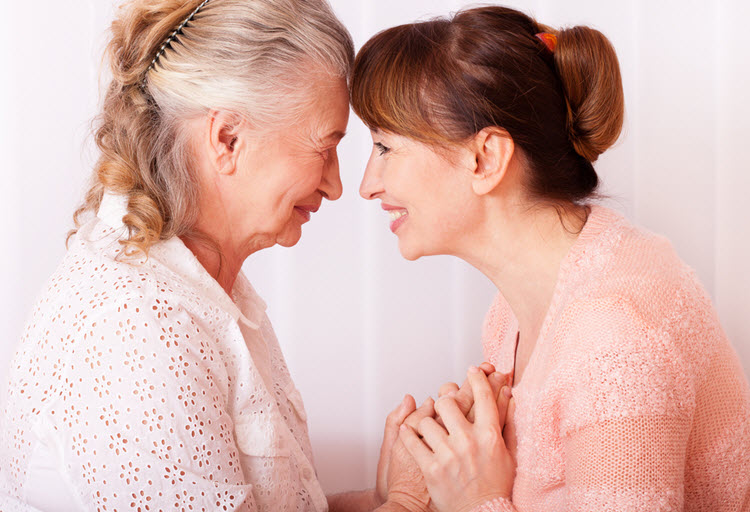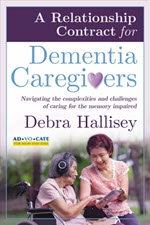One Dementia Caregiver’s Story.
In writing my new book “A Relationship Contract for Dementia Caregivers”, I had the opportunity to interview caregivers who care or cared for family members living with dementia. The lessons learned are ones of hope, love and joy. This is an excerpt of Patti’s story.
When you talk to Patti, the love for her mom is palpable in her voice and in how she describes their relationship. She uses the term ‘care partner’ when she tells her story because there was always a give and take in their relationship and that did not change despite her mom’s diagnosis of mixed dementia at the age of 65. First and foremost was her commitment to preserving her mother’s dignity while supporting and helping her to live her best life, full of travel, art and music. Patti and her mom were determined to find joy in every day.
Caregiving upends your life no matter what stage you are in. Because Patti was just starting out in her career and married life, the impact caring for her mom had in her life was different from that of someone caring for a spouse or further along in their career and marriage.
“I don’t regret leaving my job to care for mom. It just became too overwhelming. That last year I was working full time, I had a lot of absences due to appointments, or the care giver called out sick and I had to fill in. I missed a ton of work the year before she came to live with us.”
“Certainly, my marriage was different than we expected, but this made us stronger. My husband stepped up and was extremely supportive. He would hang out with mom. He built her a shower and was even a sounding board to both of us. Did we have less time together? Yes, but it feels like our marriage is stronger, because the pandemic forced us to be home a lot more. We had a lot of time together but in a different way.”
“I did go to a support group, and I was by far the youngest person there, probably by about 40 years. I ended up helping them find resources so it was not a support system for me.”
“I decided to go online and share about mom and me across social media. When I created a Facebook group and held monthly meetings, I found not only people my age but people in similar circumstances. Between Facebook and Instagram I found (and founded) my support community. Many have become real life friends along with a support system.”
“I found online resources that were excellent in terms of support and how to navigate this process. I was able to find an online music therapy which turned out to be an incredible and beautiful part of our journey. Through this resource I learned how to interact and use music to support mom in all the phases of her memory impairment. I found “Opening Minds Through Art” an incredible online experience which included an art teacher and volunteers.”
Patti knowing who her mom was at her core and about her life before the progressive brain disease diagnosis was integral to their success as care partners. Her studies to become a kindergarten teacher were invaluable as well.
“Because of my degree, I understand brain development and the impact of trauma on the brain. It was easy to translate that into my communication with mom. I knew to wait 10-15 seconds after I asked a question, so she had time to process it. I knew to limit choices. I was able to think about where she was in the disease progression and figure out what she was still capable of doing. I did not get caught up in what she could no longer do, like cooking. Instead, I focused on what she could do to help me cook and I broke down the tasks into pieces that were manageable for her.”
“I’m not going to tell you it was easy. It was hard cleaning up after shower days. I was exhausted and lost sleep every night. But I learned to experience being in the moment with her and to find things that helped us maintain a positive relationship instead of just doing things together. For example, I knew of her love of the holidays, so crafting for them gave us so much joy. She loved socializing with her friends and mine, so we did that as often as possible. She loved dogs so I got her a robotic dog. The day was structured by her likes and I knew to avoid triggers like scary shows. Even knowing her favorite foods was helpful when her appetite decreased.”
“When I talk to people about my experience, I want them to know that you can still have a positive experience, even if your connection was not wonderful all the time. This is the opportunity to find the moments when and where you can connect, even if it is five minutes. Maybe you do it by watching a show together. Whatever it is, be in the moment with them.”
To connect with Patti: Instagram: misspatticake Tiktok: carepartnerpatti Twitter: carepatti
To learn more about Patti’s journey with her mom and that of other caregivers, the book will be available on Amazon in November for National Caregivers Month. Feel free to contact me at hallisdl@gmail.com if you would like to pre-purchase a copy.
Disclaimer: The material in this blog is for educational purposes only. It is not intended to replace, nor does it replace, consulting with a physician, lawyer, accountant, financial planner or other qualified professional.
Deb is available as a caregiver consultant. She will answer the question: “Where do I start?” and find the resources to alleviate your stress. If you would like to invest a half hour to learn how she can help you, please contact her at: Free 30 minute consulting call


